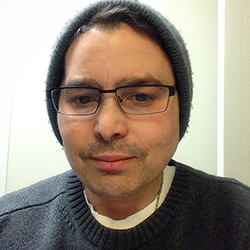Like a lot of kids, I had learned the n-word from my father. He used it on occasion when complaining about some of the residents in our city or when watching sports on television.
I knew he had a racist disposition. But at times, race seemed to matter little to him. Some of his co-workers at the Sears store where he worked were black, and I remember he enjoyed chatting and joking with them. He also knew Cassie’s parents, and he would stop to talk to them if we saw them at school or in the grocery store. He used to give them good discounts on kitchen and electrical appliances and hardware products at Sears.
So why did he use the n-word? I think it became habit for him and a way of expressing male bravado. And I had made the mistake of emulating his bad behavior.
Even so, I considered myself color blind in elementary school. Some of my friends at DeWitt Clinton were black, and I had grown accustomed to playing sports with black kids in Rome. Race did not seem like an issue to us.
Yet when I felt humiliated on the school grounds, I had yelled the insult without thinking about the person I targeted. In effect, I had proclaimed, “You are black, Cassie; you have less value than me.”
I must have apologized to Cassie at some point because we remained friends all the way through high school. But I don’t remember what I said to her or the circumstances surrounding the mea culpa. Most likely I would have apologized to Cassie either before class resumed that day or later on the bus ride home. Or maybe I never told her how sorry I was for my actions. Maybe we carried our unspoken knowledge of the incident with us as we climbed the grades in school.
And I faced no repercussions. I was not called to the principal’s office to explain my actions or confronted by my parents after school. Not being punished made me feel even guiltier about my behavior.
Cassie could have easily squealed on me. We lived on the same street as the Donaldsons on a rural road in south Rome. Her parents could have stopped by our house after work that night and shared the news with my parents.
I often wondered why Cassie never told anyone what I said (or at least I believe she didn’t). Maybe she thought, what good could come from telling her parents one of her classmates had called her a racial slur at recess? What could be gained from it except making her mother and father feel anger and heartache over the treatment of their daughter?
But I had gained something. I learned about the power of words and the impact they can have on others. I discovered how one racial epithet could imbue a girl with shame, altering her body language and stopping her from running freely on a sidewalk.
I can’t say for certain that I have never used the n-word again or that it hasn’t popped into my head on occasion. But from that day forward I don’t remember ever speaking it aloud or directing it at anyone. And I realize racism cannot be cured in one passing swoop. We must struggle every day to reject the baser tendencies of our personalities.
Fortunately, Cassie never held a grudge against me for my childhood misconduct. And I never forgot her or the lesson she taught me in the schoolyard on a spring day in the early 1980s.
 Francis DiClemente is a video producer and freelance writer who lives in Syracuse, New York. He is the author of three poetry chapbooks and his blog can be found at francisdiclemente.wordpress.com.
Francis DiClemente is a video producer and freelance writer who lives in Syracuse, New York. He is the author of three poetry chapbooks and his blog can be found at francisdiclemente.wordpress.com.